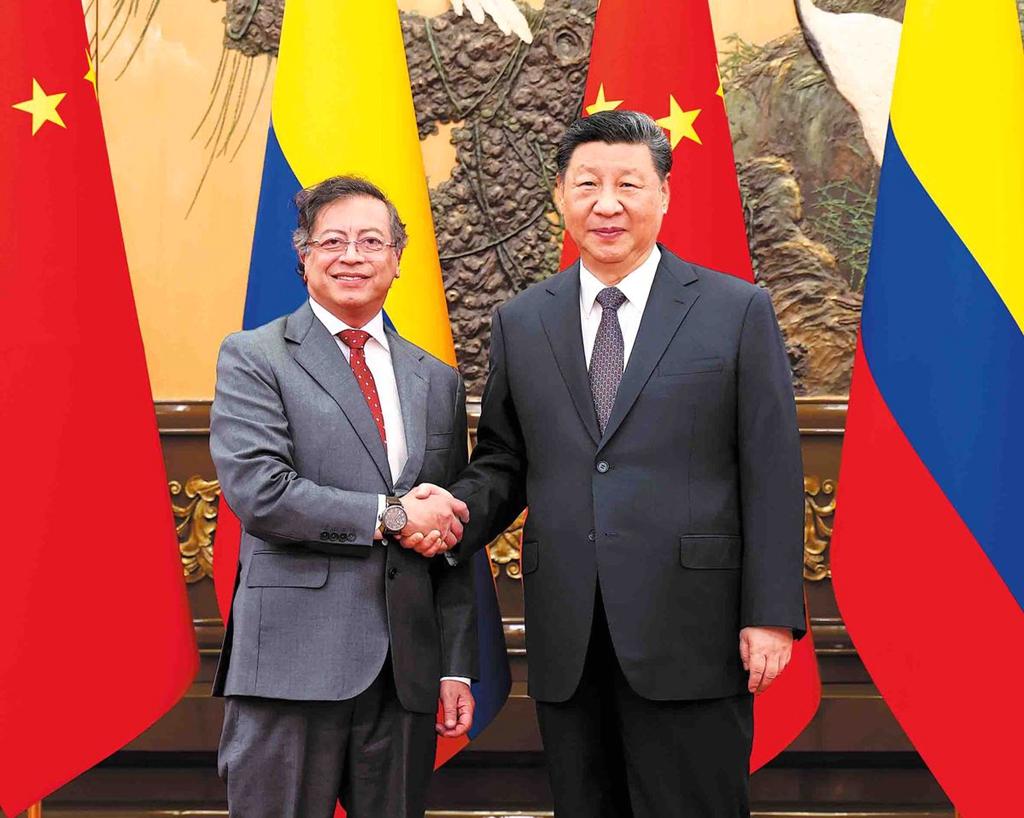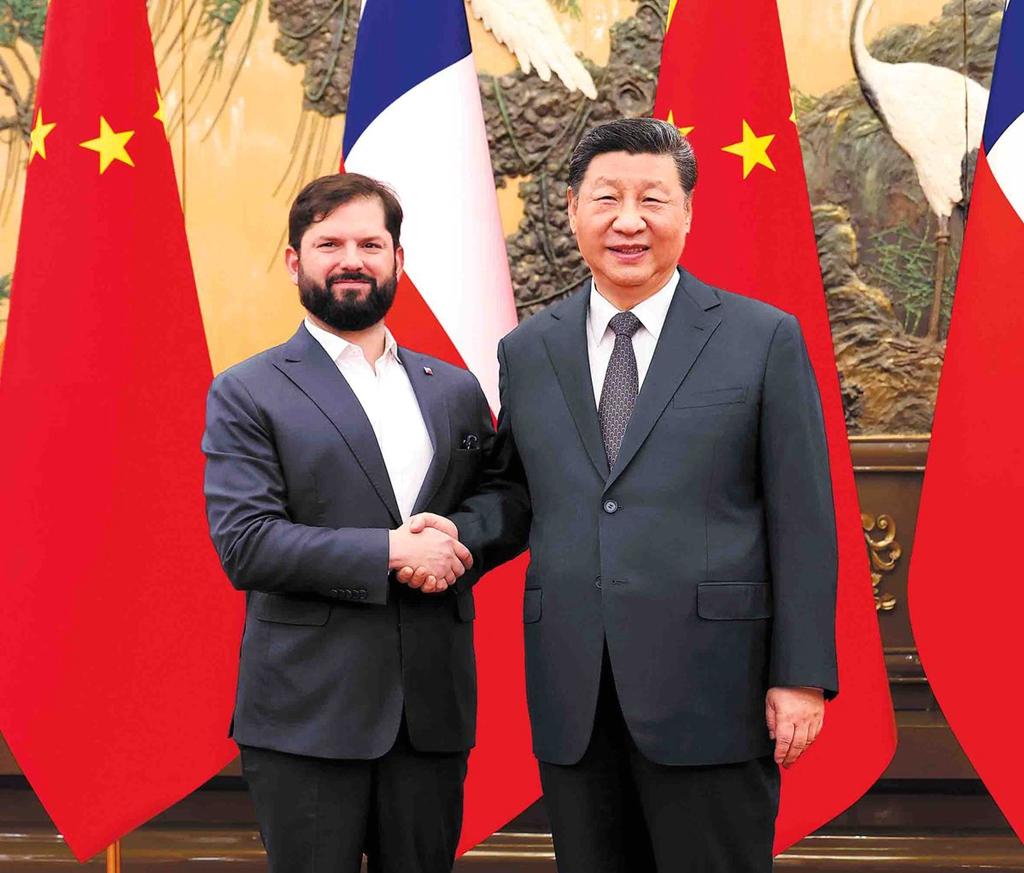Xi: Advance building of Belt and Road
President stresses importance of bilateral ties as he meets with leaders of two Latin American countries

President Xi Jinping shakes hands with Colombian President Gustavo Petro during their meeting in Beijing on Wednesday. FENG YONGBIN/CHINA DAILY
Beijing, Bogota sign cooperation plan on BRI
China and Colombia signed on Wednesday a cooperation plan on jointly building the Belt and Road, demonstrating the two countries' commitment to strengthening their partnership amid the turbulent international landscape.
President Xi Jinping and Colombian President Gustavo Petro, who is in China for the fourth ministerial meeting of the China-Community of Latin American and Caribbean States Forum, witnessed the signing of the document after their meeting in Beijing.
During the meeting, Xi told Petro that the two countries should take Colombia's formal accession to the Belt and Road Initiative as an opportunity to upgrade bilateral cooperation.
China is willing to import more high-quality products from Colombia, and supports Chinese companies in investing in the South American country and participating in its infrastructure construction, Xi said.
Both sides can further expand cooperation in emerging areas such as wind energy, new energy vehicles, the digital economy and artificial intelligence, and jointly achieve a green and low-carbon transformation, he said.
He urged both sides to ensure the success of the celebrations marking the 45th anniversary of diplomatic relations, strengthen cooperation in education, culture, tourism and other fields, enhance people-to-people exchanges and consolidate the public opinion foundation for friendly ties between the two countries.
Colombia is the CELAC rotating chair this year. The fourth ministerial meeting of the China-CELAC Forum was held in Beijing on Tuesday.
Observers said that Petro's visit to China is not only an opportunity to deepen bilateral relations, but also an important step toward promoting China-LAC cooperation.
Xi said that China-LAC cooperation is an important part of South-South cooperation, aligns with the global development and historical trend, and serves the common interests of China and LAC countries.
The successful convening of the fourth ministerial meeting of the China-CELAC Forum sends a positive signal to the world for seeking shared development and revitalization, he said.
China is willing to work together with LAC countries, including Colombia, to deepen and solidify the efforts to promote the building of the China-LAC community with a shared future to deliver greater benefits to the peoples of both regions, Xi added.
Petro said Colombia looks forward to deepening its relations with China. He underlined the need for both countries to enhance political mutual trust and strengthen mutual support.
In the current complex and volatile international landscape, the practices of some countries to pursue unilateral gains are not conducive to the world, and all countries should stand together to respond, Petro said.
Colombia is willing to closely cooperate with China to defend international fairness and justice, and safeguard the common interests of developing countries, he added.
China, Chile urged to create model of common development

President Xi Jinping shakes hands with Chilean President Gabriel Boric during their meeting in Beijing on Wednesday. FENG YONGBIN/CHINA DAILY
President Xi Jinping has called on China and Chile to work together to create a model of common development between China and Latin American and Caribbean countries, set a stellar example of South-South cooperation, and jointly promote the cause of peace and progress for humanity.
Xi made the remarks on Wednesday during a meeting with Chilean President Gabriel Boric, who is in Beijing for the fourth ministerial meeting of the China-Community of Latin American and Caribbean States Forum.
Xi hailed the development of bilateral ties, and said that China is willing to work with Chile to consolidate political mutual trust, firmly support each other on issues concerning their core interests and major concerns, and safeguard each other's sovereignty, security and development interests.
He called on the two countries to implement the Belt and Road cooperation plan, deepen cooperation on agriculture, forestry, animal husbandry and fishery, industrial investment, infrastructure and green minerals, and cultivate new growth drivers in the fields of astronomy, polar regions, artificial intelligence, biomedicine and the digital economy.
China supports more Chinese enterprises in investing and doing business in Chile and welcomes more high-quality Chilean products to enter the Chinese market, he said.
Saying that the international situation is turbulent and complex, with waves of unilateralism and protectionism causing serious disruption to the international economic and trade order, Xi urged China and Chile, which he described as staunch defenders of multilateralism and free trade, to enhance multilateral cooperation to safeguard the common interests of the countries of the Global South.
Boric said that China has become Chile's most important trading partner, and bilateral cooperation has benefited the two peoples.
Chile will firmly adhere to the one-China principle, and is ready to expand cooperation with China on trade, investment and artificial intelligence, jointly advance high-quality Belt and Road cooperation, and strengthen people-to-people and cultural exchanges, he said.
All countries should adhere to free trade, mutual benefit and win-win results, Boric said, adding that trade should not only serve the private interests of one individual country and waging a trade war leads nowhere.
Chile is willing to work with China to firmly safeguard multilateralism and the authority of the United Nations, insist on resolving differences through dialogue, and jointly uphold international fairness and justice, he said.
This is Boric's second visit to China since he became Chilean president in March 2022, with the previous one taking place in October 2023. During the latest visit to China, the two countries signed a number of cooperation documents in fields such as the economy, publishing, inspection and quarantine, media and think tanks.